Limited Time Discount! Shop NOW!
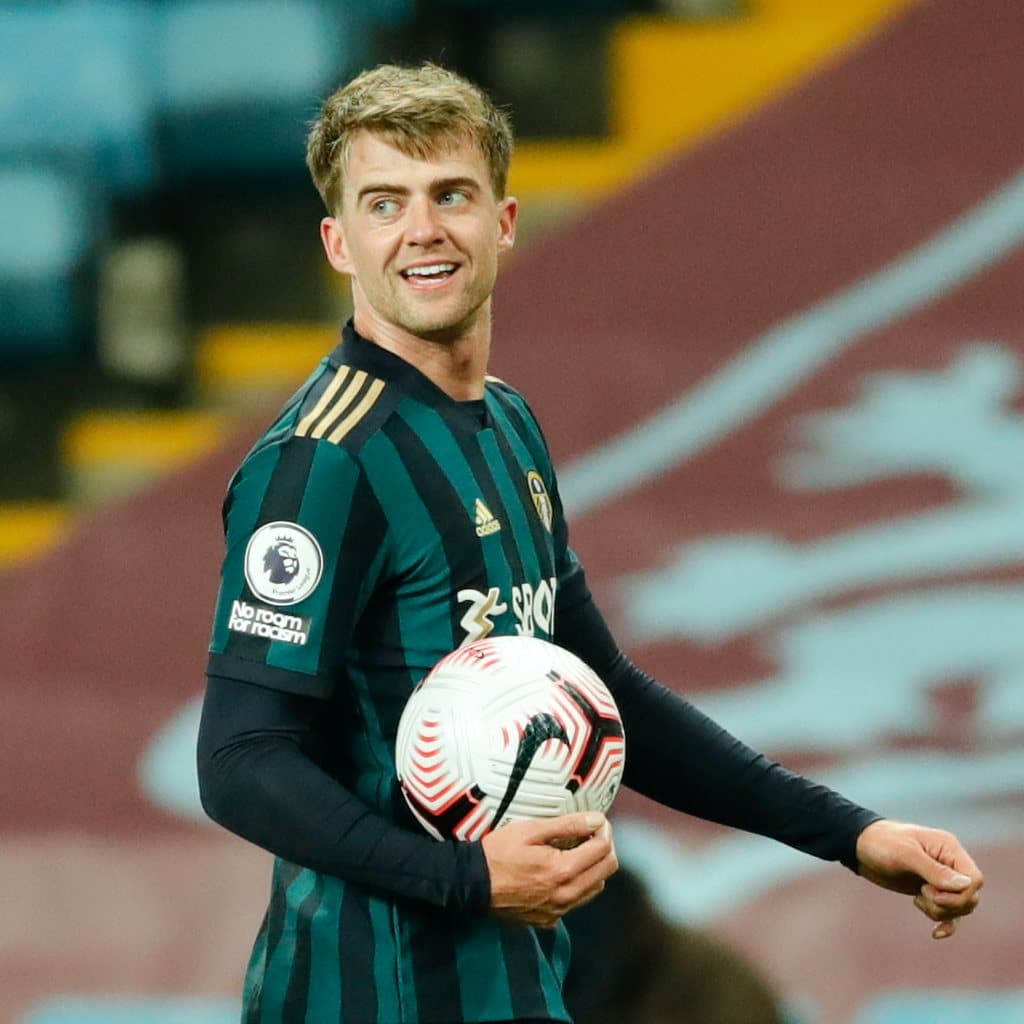
Three provocations, three Pat Bamford goals.
The first goal started just before half-time, when Bamford didn’t like the contact from Ezri Konsa after he’d finished putting a Jackie Harrison cross just wide. He complained to the player, he complained to the referee, and early in the second half, he pounced on the rebound from Rodrigo’s shot to score. 1-0, and also 1-1.

The second goal went back to April 2019, and Bielsa’s ‘let them’ goal. Bamford made a name for himself that day, and when he went down injured in the penalty area here, Tyrone Mings remembered it: Diving Cheating Bastard. Mings, as if he had never seen Jack Grealish play, dragged Bamford to his feet then threw him to the ground again. Two minutes later, played in by Mateusz Klich, Bamford took an unexpected chance, shooting into the nearest top corner from the edge of the penalty area. It was a merciless finish, and he can’t have resisted a glance at Mings. Did he like it? 2-0, and 2-2.
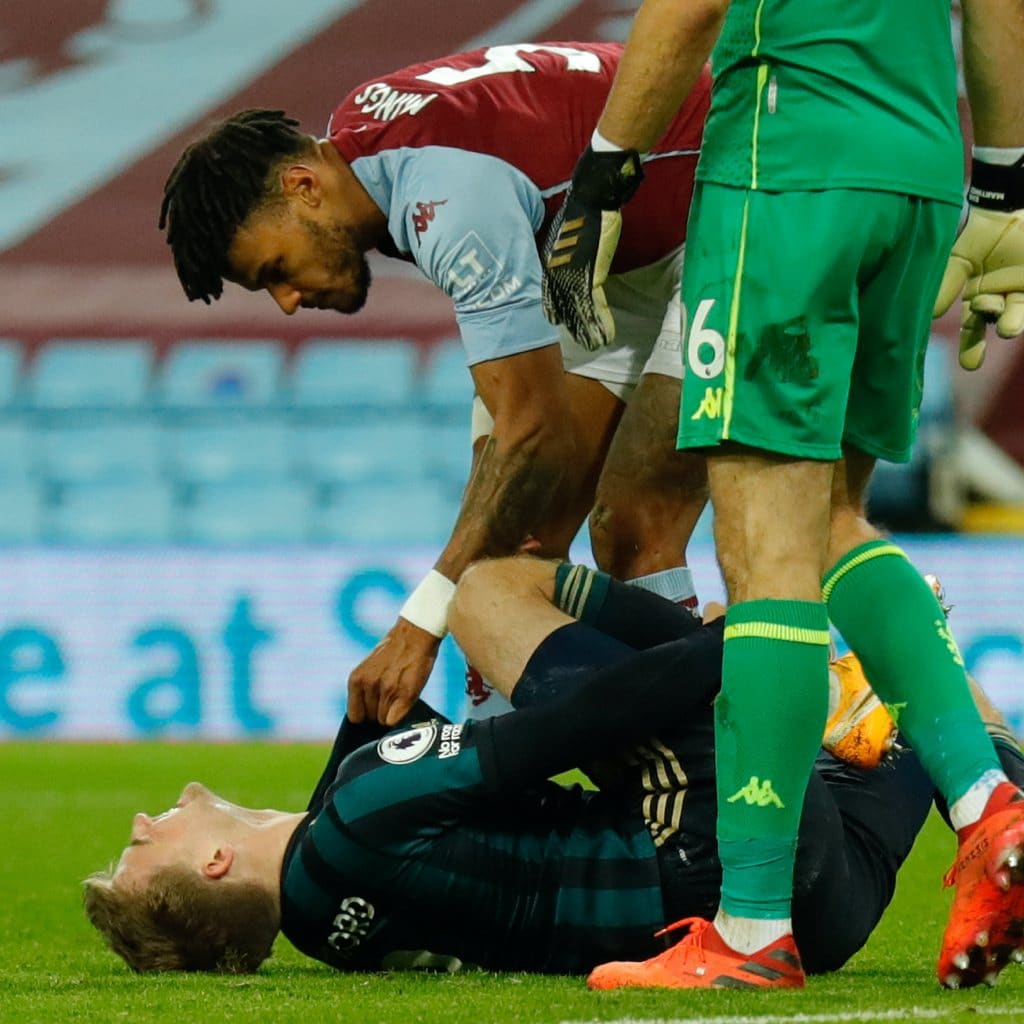
The third goal began either with Rodrigo’s visionary pass wide to Helder Costa, who ushered the ball into the box with Jamie Shackleton’s help; or it began with ex-Villa forward Gabby Agbonlahor’s very worthwhile week, in his head, on social media and radio. “Someone was saying in the press that Bielsa was a myth,” said Bamford, in his post-match interview. “And I think we’ve shown everyone that Leeds are here and we’re here to compete.” And Bamford was there, in the box, surrounded by claret and blue, finding a gap to score a hat-trick, end the contest, equalise 3-3, and take the night: 1-0, Patrick Bamford.
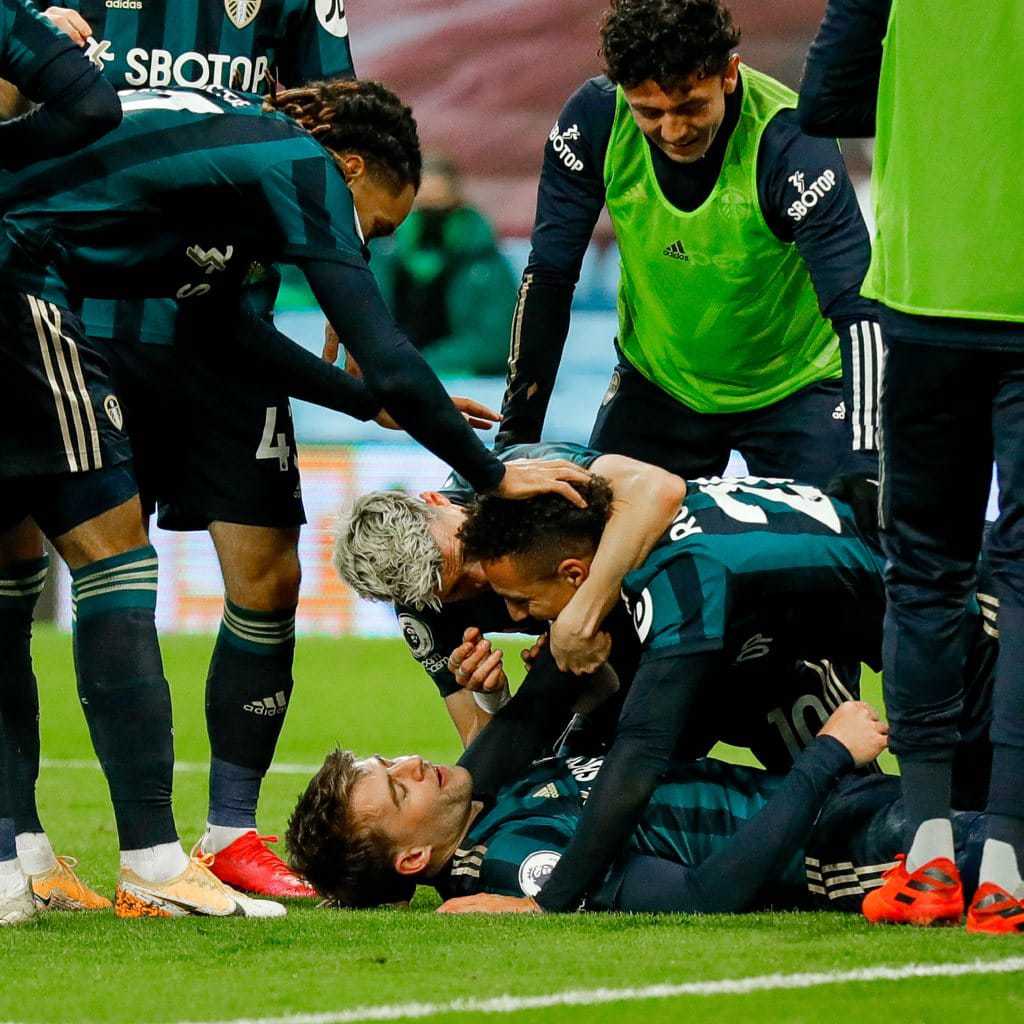
Settling scores is a low key Bamford speciality. Also post-match, rather sweetly, he couldn’t remember the exact date of his dad’s birthday — “On… um… in a couple of days” — when it does come round he’ll be getting the match ball. But he was quick to emphasis that he doesn’t count any of his Premier League games before this season because he remembers very well that he never got a fair crack. “I was always playing two minutes off the bench, five minutes here and there.” Now he’s six in six, and the past only matters as motivation, the pepper-grind throat of Sean Dyche being filled not with worms but his own words.
It’s never clear with Bamford whether the adverse commentary on social media, from TV pundits, from idiots on podcasts, from fans and ex-managers is getting him down or spurring him on. This match was a perfect microcosm. The chance before half-time was not his first but by far the best, and as the ball hit the advertising hoardings a pitchside microphone picked up someone shouting, ‘Ohmi GOD!’ Was it Harrison in disbelief or a relieved defender? Someone on the pitch did the work of the absent crowd, anyway, and Bamford agreed it was a bad miss. Afterwards, he said those first half chances were in the back of his mind, spurring him on to score in the second half. That’s a fourth provocation, and Bamford’s eternal conundrum: does he score three in the end without something to prove? He doesn’t like criticism. Who does? But he likes proving it wrong.
Bamford is a constant push and pull. This time last year he had even pushed Marcelo Bielsa’s almost infinite patience: four in fourteen, no goals in nine, Bamford was dropped. Only Eddie Nketiah’s testicular trouble kept Bamford in the team to play QPR, but being so close to the edge seemed to provoke Bamford into action: performances improved, goals came back, Nketiah was summoned back to London. Had Nketiah played it could all be different. Bamford keeps the ends out for the tie that binds him, as Johnny Cash sang, to our hearts: he walks the line.
The delight of this hat-trick isn’t only that it puts Bamford back on course for 38 goals in 38 games, but that it bucks his streaky tendencies. The appreciation of his workrate has grown to fill those fallow months, but he’s playing to a new gallery in the Premier League who will judge on goals alone. This time he hasn’t let two goalless matches become three, or four, or nine, and if instead of boom and bust he can keep to this pattern, scoring in four of every six games, he’ll be having a very good season. You can back him right now, whatever happens, to score against Burnley at Elland Road, and ruin Sean Dyche’s Boxing Day.
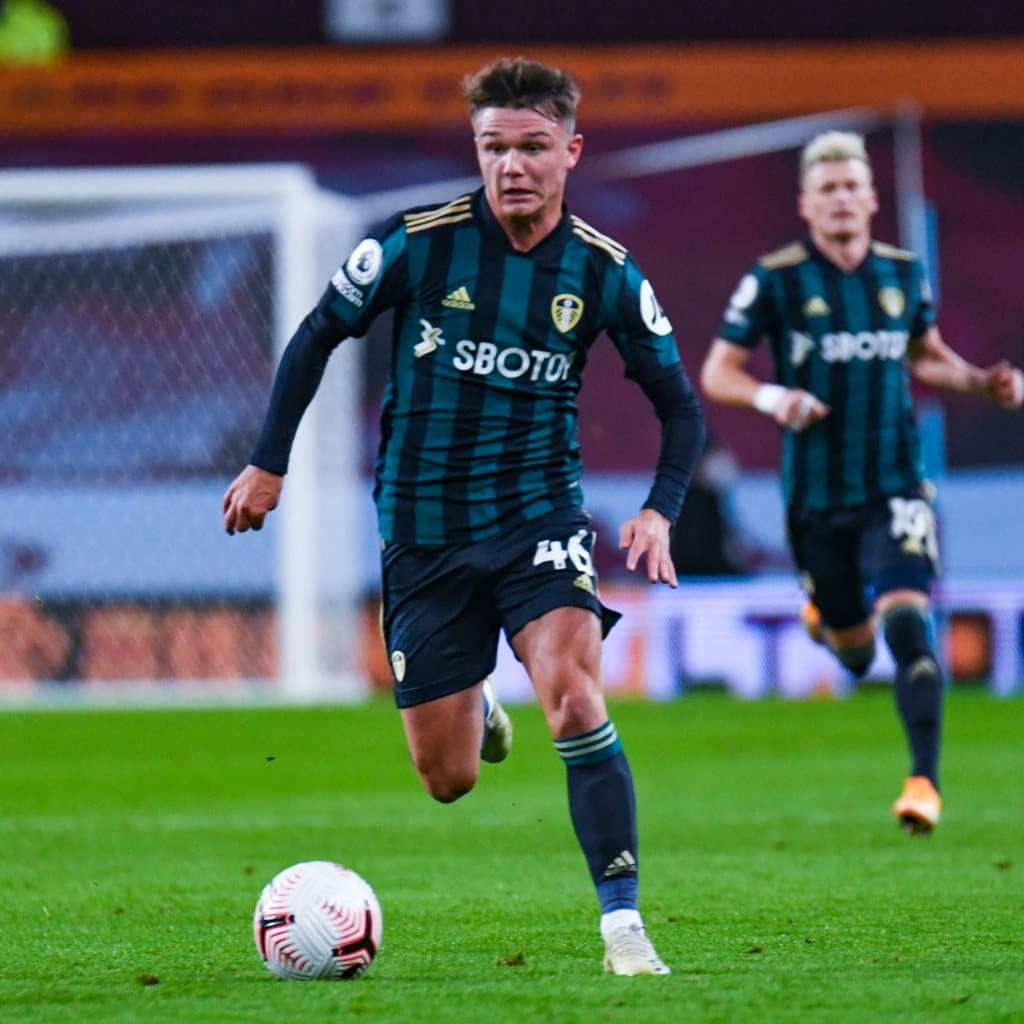
Leeds are having a very good season already, and this team performance had its provocation in common with Bamford’s. Since the Fairest Day back in April 2019, Aston Villa fans and pundits have been engineering one of those tiresome one-sided rivalries that Carlisle inflicted on us in League One. Their start to the season has been phenomenal, winning four and putting seven past Liverpool, but this is why Leeds are in the Premier League: to take teams that are turning good form into cockiness and put them firmly in their place.
The players were out in force after the game in each others’ Instagram comments — the 2020 equivalent of Flying Pizza on the house and a lock-in after-hours — Ian Poveda not playing but scoring a high 9/10 for describing Villa Park as ‘Pat’s Back Garden’. Bamford wouldn’t say the name in his interview, but Agbonlahor’s interest had been noted, and the first meeting since our FIFA Fair Play award was all about settling scores with a club that, in a season apart, had taken too much interest in United’s business. There’s a place for Villa in the corner with Thomas Frank, and the fun on social media spoke to the pleasure the players were taking. Some nights, after a game, you might not look. And some nights you don’t want to put the phone down.
United’s performance seems to have surprised people who were easing themselves into thinking Dean Smith, Grealish, Mings and Ollie Watkins are a team with permanent aspirations at the top of the table. You’d think people would be over the shock of Leeds and Bielsa by now, but it seems like only West Yorkshire where delight in this sort of game has been replaced by a deeper pleasure, like sinking into a favourite sofa, anticipating what’s coming when we feel the team is turning it on. We can see the signs, and hardly raise an eyebrow anymore at the post-match stats. 27 attempts on goal is almost one every three minutes; nine were on target, and if Leeds had tucked one away in the first half, the floodgates might have given way to a torrent. Late substitutions brought on Raphinha and Pablo Hernandez, and the first drilled a cross-field through ball so Harrison could set up the second, who should have paused to score from the pull-back; deep in stoppage time, Harrison himself led a counter attack of six players, and when his shot hit the side netting, the referee stopped Villa’s punishment.
Harrison was effective all night against Matty Cash down United’s left. On Villa’s left, Grealish caught the eye with one excellent piece of control in the first half, a few cutbacks towards Watkins, and shooting a loose ball that Luke Ayling cleared off the line; he was to the fore in a ten minute spell when Leeds got sloppy. In the second half he made one slalom run and Meslier saved the shot at the end, and that was it. If you want to put numbers on it, Harrison set up four shots for others, Grealish set up one; Harrison’s expected assists — the number of goals he set up in theory — was 0.67. Grealish’s xA was 0.21. For threat and productivity from the left, only one player looked like an England international.
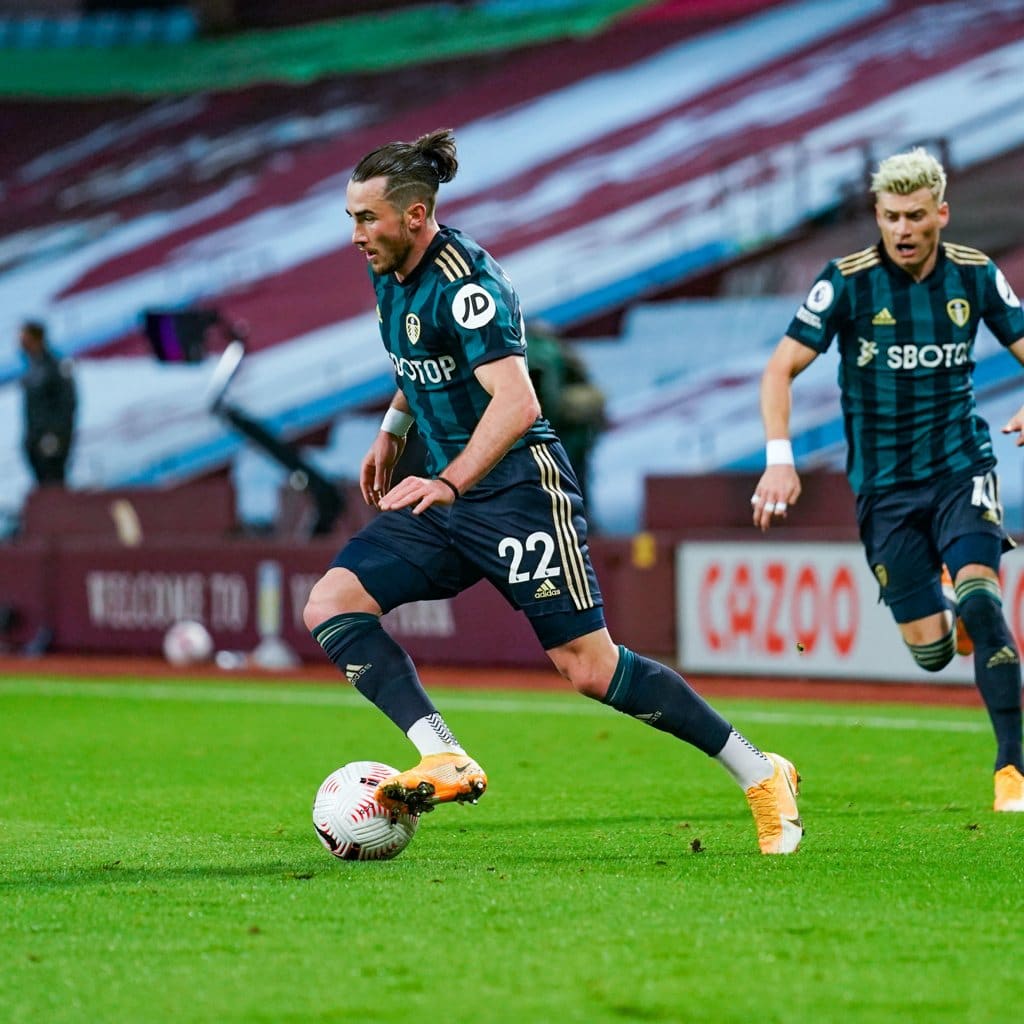
Grealish’s other contribution was staying down as if heavily wounded for so long that the referee upgraded a telling off for Pascal Struijk to a yellow card. With seventy minutes ahead Struijk presented too much of a risk as Kalvin Phillips’ deputy, so he was subjected to one of the chastening early withdrawals that Phillips twice endured, with a morose perimeter walk keeping him in the background of the game like a shamed uncle glimpsed outside a wedding.
Leeds hardly missed a beat without Phillips or him, and were it not for Bamford the night belonged to Shackleton. His lack of first team appearances has raised doubts about his progress, but based on this game, the only problem he has is Mateusz Klich. If Klich ever missed a match we might see enough of Shackleton to realise he meets the standard to play in this team every week, but every week, Klich starts. With Struijk off Klich, who relished linking with Robert Lewandowski as Poland’s playmaker the other week, dropped to defensive midfield, and his all-engine, all-imagination combination with Shackleton contributed to overrunning Villa. That first-half chance for Bamford started with Shackleton trading clever headers with Rodrigo in midfield; the first goal began with Shackleton authoritatively opening the left side of the pitch, then chasing into the six yard box ready for the rebound to bounce another way; he was in the box again to help Costa set up the third, and Villa’s night was occupied by his rapid runs from midfield, Klich itching to join him.
Such changes of personnel are another aspect of this team that attracts comment elsewhere but is blithely accepted in Leeds. That Shackleton and Klich can replace Klich and Phillips and make the team look, arguably, even better than it does with an England international defensive midfielder, feels more like the pleasant confirmation of a suspicion we held than a surprise. Have you ever seen Bielsa worried about missing a player? Illan Meslier and Robin Koch, theoretically the greenest in this team in the most pressurised positions, have played every minute at the back, while the second defender has changed from Struijk to Liam Cooper back to Struijk to Ayling, and the wingbacks have switched and Phillips has been a midfielder and a defender then an absentee and Struijk and Klich both took over. But Meslier and Koch don’t look bothered about who they play next to. On the strength of Koch’s games so far, someone could argue a bargain with Brighton over Ben White: how can they keep asking for £30m when Leeds replaced him for half the price like this?

That smooth adaptation, not only in the team but to the Premier League, is giving Leeds momentum that might be the only thing Leeds fans didn’t expect so soon. We’re supposed to be allowing the team time to find their feet in the top flight, stretching to new boundaries and towards new horizons. Instead they’ve taken on the Premier League’s form team, gathered up their grudges, and battered them. Leeds get more attention than many clubs, but they’re not shy when provoked. The more they’re getting from this league, the more they’re giving. ◉
£16.00
£9.00
Copyright © The Square Ball Media Limited All Rights Reserved
WordPress Development By Clio Websites